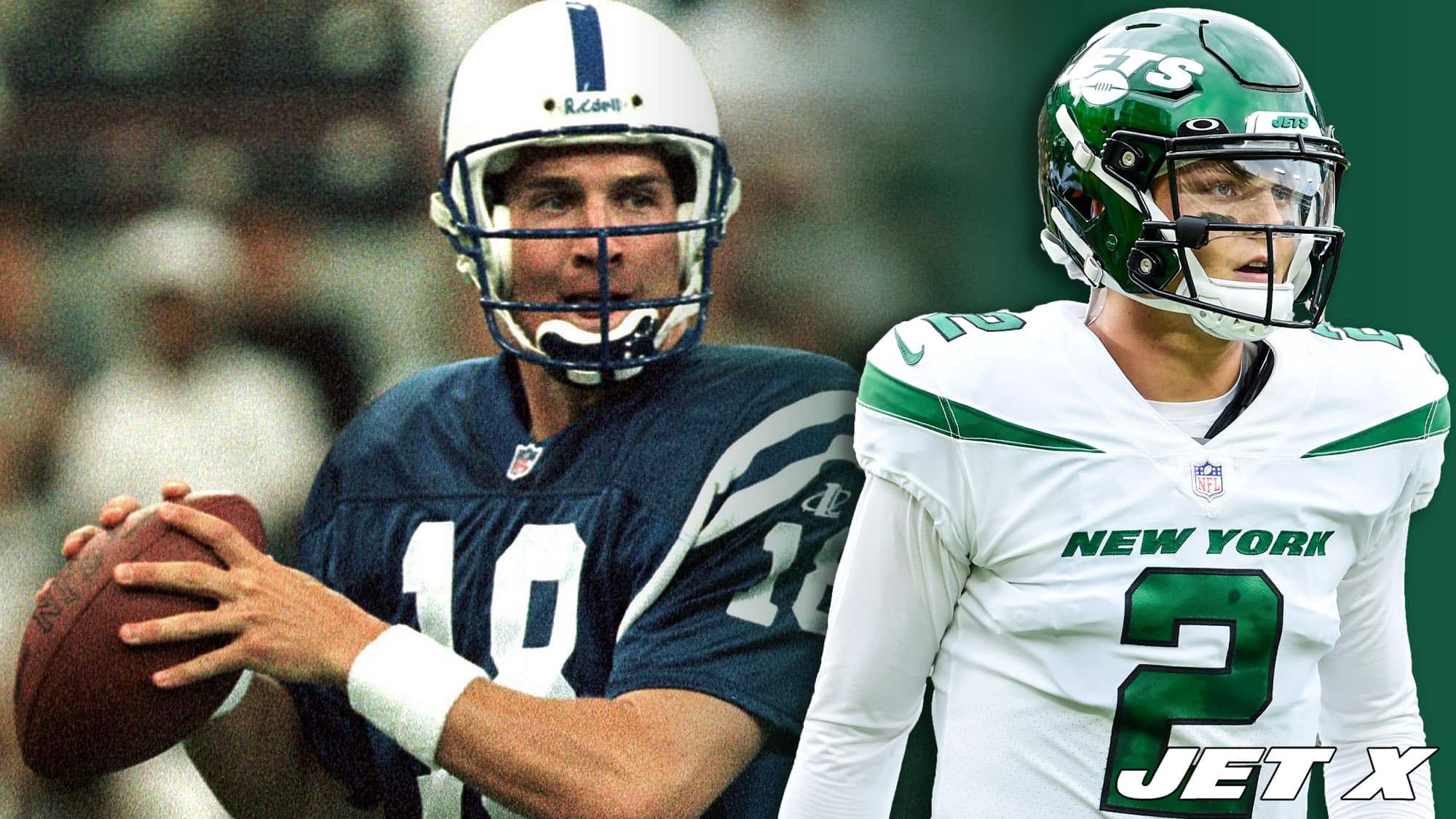Zach Wilson is not alone in his misery
Zach Wilson has had a poor start to his rookie season as the New York Jets franchise quarterback.
Yes, growing pains were expected; but things have gotten really ugly, even by rookie standards.
Wilson is tied with fellow rookie Trevor Lawrence for the NFL lead in interceptions with seven. That ties them for the third-most interceptions through a quarterback’s first three career starts since 2000, trailing only Alex Smith (8) and Keith Null (9).
The rookie’s struggles go beyond merely his turnover woes. Wilson ranks last among qualified quarterbacks in passer rating (51.6), QBR (22.1), net yards per pass attempt (4.3), and sacks taken (15).
While Wilson’s start is not ideal, he would be far from the first quarterback to bounce back from monumental early struggles to become a great player. These five eventual franchise quarterbacks suffered through starts that were similar to Wilson’s or worse.
Eli Manning (2004)
- Stats: 0-3 record, 35/83 (42.2%) for 423 yards, 1 touchdown, 4 interceptions. 42.4 passer rating, 5.1 yards per attempt
The man who this past Sunday did what Wilson hopes to do one day – get his number retired at MetLife Stadium – was awful over his first three NFL starts.
Eli Manning took over as the Giants’ starter in Week 11 of his rookie season and had an even worse passer rating and yards per attempt average over his first three starts than the marks that Wilson currently owns. He led the Giants to no more than 10 points in any of those games.
Things got even worse in game four. Manning completed 4-of-18 passes for 22 yards, no touchdowns, and two interceptions, earning a 0.0 passer rating.
Eli began showing promise in starts five through seven to close his 2004 rookie season. Over those three games, he threw five touchdowns, three interceptions, and posted an 82.9 passer rating as the Giants went 1-2 but scored 26.7 points per game.
Manning led the Giants to an 11-5 record in his second season after going 1-6 as a rookie, but he still had room to grow after throwing 17 picks and posting a passer rating of just 75.9.
There was not much growth for Manning in years three and four. He posted a sub-80 passer rating in both seasons while increasing his interception totals to 18 and 20 in 2006 and 2007. The Giants won the Super Bowl in spite of Manning’s league-high 20 interceptions in 2007 – but Manning did flip the switch over New York’s four-game playoff run with six touchdowns, one interception, and a 95.7 rating.
Manning finally broke out to a solid level in year five. In 2008, Manning made his first Pro Bowl as he threw for 21 touchdowns, 10 interceptions, and a career-high 86.4 rating. This season began a long stretch of respectable play for Manning, as from 2008-15, Manning averaged 256.3 passing yards per game on 7.4 yards per attempt with an 87.7 passer rating.
Drew Bledsoe (1993)
- Stats: 0-3 record, 62/123 (50.4%) for 625 yards, 4 touchdowns, 4 interceptions. 62.6 passer rating, 5.1 yards per attempt
Drew Bledsoe took better care of the ball than Wilson and tossed a couple more scores, but he was even more stagnant when it came to pushing the ball down the field.
Bledsoe uncorked 123 passes and turned them into only 625 yards for a putrid average of 5.1 yards per pass attempt, which ranked third-worst in the league through that point of the 1993 season. Wilson is currently fifth-worst at 6.0.
Tom Brady’s eventual predecessor struggled throughout the majority of his rookie season, finishing third-worst in yards per attempt (5.8) and passer rating (65.0).
In his second season, Bledsoe led the league in passing yards (although he also led the league in interceptions) as he helped the Patriots win 10 games. He made the first of his four Pro Bowl appearances.
Showing that progression is not always linear, Bledsoe fell down to Earth in his third season. In 1995, Bledsoe had more interceptions than touchdowns while posting the league’s third-worst passer rating (63.7). New England went 6-9 in his starts.
Bledsoe finally hit his stride for good in 1996, his fourth season. He posted a career-best 83.7 passer rating (8th in the NFL) and led the Patriots to the Super Bowl. That campaign began a solid four-year run with the Patriots that featured a 42-35 regular season record, 248.5 passing yards per game, 7.1 yards per attempt, 94 touchdowns, and 65 interceptions (82.0 rating).
Get Started: Learn More About Becoming A Jet X Member
Donovan McNabb (1999)
- Stats: 1-2 record, 43/85 (50.6%) for 397 yards, 3 touchdowns, 2 interceptions. 65.7 passer rating, 4.7 yards per attempt
Donovan McNabb picked up a win within his first three starts and did rush for 44.3 yards per game, but his passing was abysmal.
McNabb averaged just 132.3 passing yards per game and 4.7 yards per pass attempt over his first three starts. Considering that he also took nine sacks for 85 yards, McNabb only produced 104.0 passing yards per game.
The Syracuse product’s passing woes persisted throughout his rookie year as he finished the season with an average of 4.4 yards per attempt.
McNabb broke out in his second season, making his first of five straight Pro Bowls. He would play 11 seasons in Philadelphia, leading the team to a 92-49-1 regular season record and a 9-7 playoff record.
Early in his career, McNabb continued to be a subpar passer while he relied on his legs to do damage, but he gradually improved his passing each year until he became a great thrower later in his career.
From 2004-09, McNabb averaged 254.1 passing yards per game on a strong average of 7.5 yards per attempt while throwing 129 touchdowns and only 51 interceptions (2.5-to-1 ratio). He earned a passer rating of 92.3.
That was a huge step up from McNabb’s first four post-rookie-year seasons from 2000-03 when he averaged 208.7 passing yards per game on 6.4 yards per attempt with 79 touchdowns, 42 interceptions (1.9-to-1 ratio), and an 81.5 passer rating.
John Elway (1983)
- Stats: 2-1 record, 28/62 (45.2%) for 313 yards, 1 touchdown, 3 interceptions. 46.0 passer rating, 5.1 yards per attempt
John Elway had a gruesome rookie season after being chosen first overall in 1983. He finished the year with seven touchdowns, 14 interceptions, 151.2 passing yards per game, 6.4 yards per attempt, and a 54.9 passer rating over 10 starts. The Broncos went 4-6 under his lead.
Elway was especially terrible over his first three starts, completing just 28 passes. In his very first start, Elway completed one pass on eight attempts.
The 1983 season turned out to be one of only two in Elway’s 16-year career where he posted a losing record. Elway led the Broncos to 12 wins in his second season and never looked back, finishing with a 148-82-1 regular season record in Denver.
It did take a long time for Elway to become the Elway that he is remembered as, though. He finished below the league average in yards per attempt in five of his first six seasons. It was not until 1989 – his seventh season at age 29 years old – that Elway began to consistently dominate.
From there on out, Elway finished above the league average in yards per pass attempt in 10 consecutive seasons to close his career.
Peyton Manning (1998)
- Stats: 0-3 record, 62/114 (54.4%) for 683 yards, 2 touchdowns, 8 interceptions. 49.0 passer rating, 6.0 yards per attempt
Ah yes, Peyton Manning. For over two decades now, Manning has been used as the most glaring example of why not to worry about a struggling rookie quarterback.
Manning led the NFL with 28 interceptions as a rookie. That ties him for the 11th-most interceptions thrown through a quarterback’s first 16 career starts in league history. The total has not been matched since Manning did it.
The first three games of Manning’s 1998 rookie season made up easily the worst stretch of his ugly campaign. His 49.0 passer rating from Weeks 1-3 was the worst passer rating he would post over a three-game stretch over the entire season.
Not only that, but it ended up as the worst passer rating he would post over a three-game stretch in his entire career.
Zach Wilson is hoping he can look back in the future and say the same.
Next Article: Joe Douglas’ tight end neglect deserves heavy criticism
Audio Version available to members only: Learn more here
Want More NY Jets News & Jets X-Factor Content?
Download the free Jet X Mobile App to get customizable notifications directly to your iOS (App Store) or Google/Android (Google Play) device.
Add Jets X-Factor to your Google News feed to stay up to date with the New York Jets.
Follow us on Twitter @jetsxfactor for all the latest New York Jets news, Facebook for even more, Instagram for some of the top NY Jets images, and YouTube for original Jets X-Factor videos.
Join the official Jets Discord community to connect with likeminded fans.














Wilson has to progress. Protections problems of the Oline are are well documented, but the TE’s are horrendous, TY Johnson has to improve his pass blocking. But the thing that will damage Wilson’s confidence the most is the DROPS.
I feel like if the OL can protect Zach for even a hair longer, he would do better.
Don’t forget about Troy Aikman, who had an absolutely brutal start to his career. 6 interceptions and 1 TD through his first three games. His third game he went 6/21 passing for 83 yards. That 1989 Dallas squad is definitely one to look at in terms of expectations of a young team with a rookie QB and rookie head coach. But also one to look at in terms of setting up building blocks for future success.